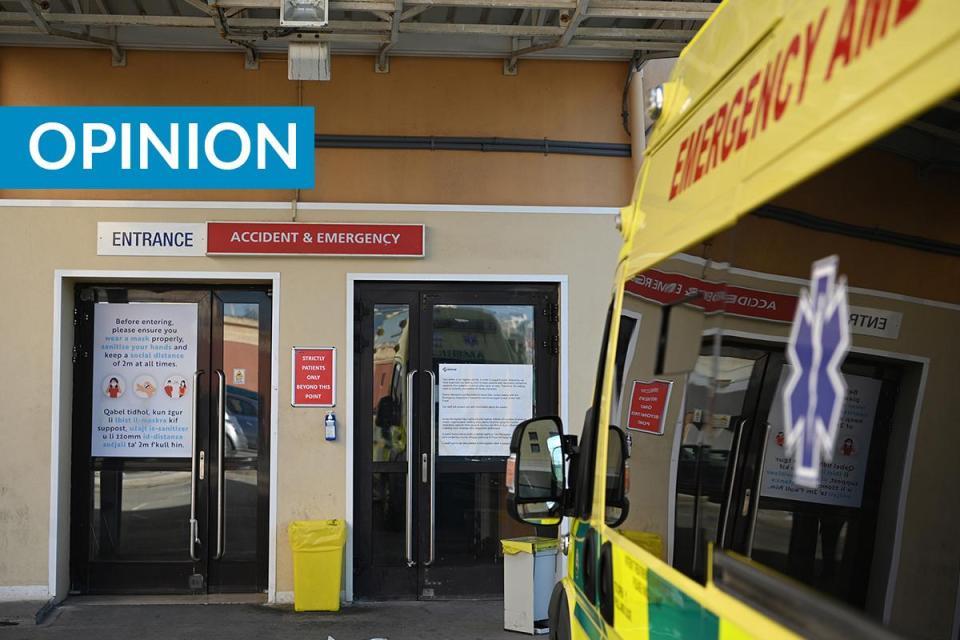We are not managing by crisis
The health service is in evolution

There are few thoughts that are, all too often, boring into everyone’s mind. Health is surely one of them.
I believe health is ever-changing and its delivery must constantly change and adapt to meet new expectations and developments.
In my introductory addresses to newly graduated healthcare professionals, I always underline and welcome their privilege to be entrusted with the lives of fellow human beings, improving their quality of life by restoring health. One simple way of looking at it is, we are constantly tricking nature, cheating death.
We are expected to exercise our professions with beneficence and non-maleficence, firmly rooted in distributive justice.
The present and future of healthcare relies on the bedrock of good clinical governance and proactive teamwork. With experience, one develops that acute sense of situational awareness.
Bitter experience shows that siege mentalities and blame games hardly ever improve outcomes. Much has been said about our emergency services, most of it admittedly true.
But perspective is key here and the basis for the reforms we have embarked on is a detailed assessment of our human resources and assets, coupled with some thinking outside the box.
Statistics do not lie.
When as a young man I was deployed to the Emergency Department of St Luke's Hospital in the year 2000, four doctors used to man the place at night.
I have bitter recollections of having as many as 18 patients to my name, at any one time.
At present, no less than 30 doctors are deployed in our Mater Dei Accident and Emergency Unit at peak times.
Mater Dei Hospital’s average registration-to-triage waiting time and average emergency department stays have not changed, clocking 15 minutes and five hours respectively. Holiday long weekends stress capacity to buckling.
However, it is certainly untrue that long-waiting “bed-blockers” (older persons awaiting long-term care) are causing some form of unmitigated crisis. In fact, “bed-blockers” are at an all-time low, hovering around the 50 mark.
Then, there are those who revel in stressing about COVID spikes.
Again, to date, such utterances are pure fantastical speculation. The severity of the viral illness has not heightened and there is no rationale for such deliberate disinformation.
The emergency care reforms we studied and proposed over the past seven months have been branded unsafe and amateur.
Yes, change is painful, however, the professionals’ privilege of looking after patients needs to be move in line with what patients expect of their professionals.
What is so unsafe and amateur about the ministry’s direction to go for patient streaming by first senior medical contact?
For patients with serious emergencies to be directly and constantly under emergency specialist care? I am satisfied these initiatives kicked off on August 1.
Siege mentalities hardly improve outcomes- Jo-Etienne Abela
What is wrong with having an emergency hotline service manned by hospitalists that have the education, skills and resources that enable them to direct patients according to severity scoring?
Don’t our citizens deserve properly manned health centres providing low-severity care round the clock, five health centres instead of three?
Why should the government shy away from treating low-severity cases in local public-private partnerships (PPP) with excellent track records?
Our efforts mirror similar ones proposed in draft legislation by the German government, a country of 80 million, which, like us, wants to meet public expectations.
What is wrong with investing to renovate a makeshift ward into a fully-fledged modern ward and acquiring more clinical space for wards and theatres through shifting non-clinical services?
We invested in renovation of state older person homes, record numbers of PPP placements for older persons in the community, solid financing for live-in carers, a new IVF clinic at Mater Dei, more IVF PPP procedures, tens of thousands of extra in-house CT and MRI scans, more robotic operations, a new endoscopy room, more joint replacements on Sunday lists and in the private sector, record numbers of nurses and carers.
We pledge to build an extension to the emergency department, an extension to ITU, a new acute psychiatric unit, a third angiogram operating suite and a hybrid operating theatre for life- and limb-saving vascular procedures.
Lest this is not enough to convince you we are not managing by crisis, I have not mentioned our ground-breaking reforms in psychiatric care, the innovative MR Linac unit treating cancer patients or the Paola Hub, due to start operations this September.
I have not touched upon our planned reforms in clinical pharmacology and procurement and the deep emphasis we intend to place on crucial preventive care/screening and transplantology.
Jo-Etienne Abela is Minister of Health.